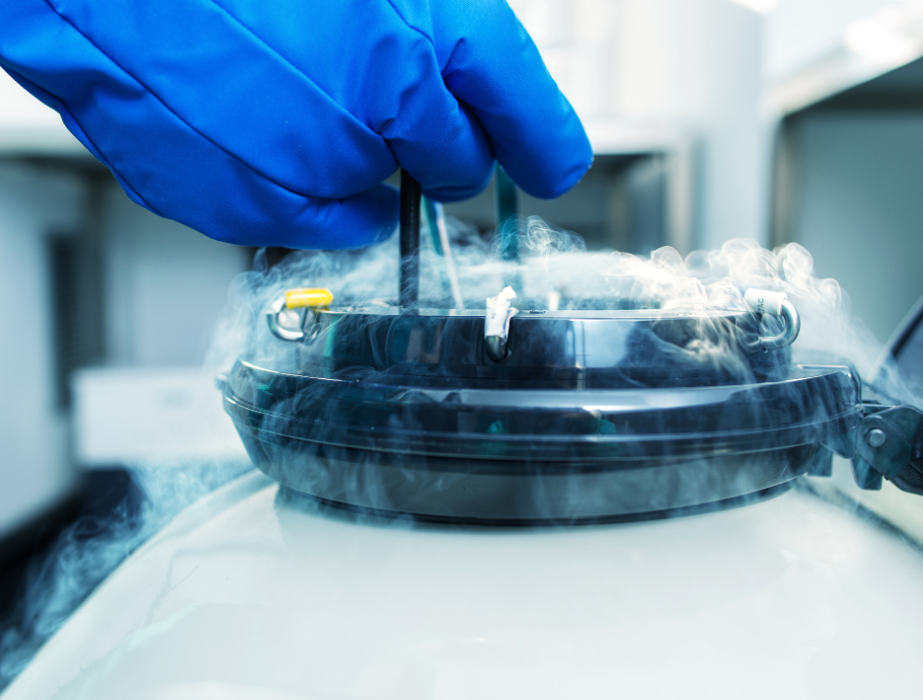
Table of Contents:
- Understanding Nitrogen Generators
- Key Considerations for Purchasing a Nitrogen Generator
- Common Applications of Nitrogen Generators
- Popular Nitrogen Generators on the Market
- Making the Final Decision
In the modern laboratory, nitrogen generators have become indispensable tools, providing a reliable and continuous supply of high-purity nitrogen for various applications. Whether for gas chromatography, liquid chromatography-mass spectrometry (LC-MS), or sample preparation, selecting the right nitrogen generator can significantly impact the efficiency, accuracy, and cost-effectiveness of laboratory operations. This guide aims to simplify the purchasing process by highlighting the key considerations and comparing popular nitrogen generators to help you make an informed decision.
Understanding Nitrogen Generators
What is a Nitrogen Generator?
A nitrogen generator is a device that separates nitrogen from compressed air to provide a continuous supply of pure nitrogen gas. Unlike traditional nitrogen supply methods, such as gas cylinders, nitrogen generators offer a more sustainable and cost-effective solution, eliminating the need for regular deliveries and storage of high-pressure gas cylinders.
How Nitrogen Generators Work
Nitrogen generators use different technologies to separate nitrogen from other gases in compressed air. The two most common technologies are Pressure Swing Adsorption (PSA) and Membrane technology. Find out which generator technology is right for you.
Pressure Swing Adsorption (PSA) Technology
PSA nitrogen generators use carbon molecular sieves to adsorb oxygen, carbon dioxide, and other trace gases from compressed air, leaving behind high-purity nitrogen. The process involves alternating between two adsorber beds, ensuring a continuous supply of nitrogen. PSA technology is known for its ability to achieve high nitrogen purity levels, often up to 99.999%.
Advantages:
- High nitrogen purity (up to 99.999%)
- Reliable and consistent performance
- Suitable for a wide range of applications
Disadvantages:
- Higher initial cost compared to membrane systems
- Requires regular maintenance of adsorber beds
Membrane Technology
Membrane nitrogen generators use semi-permeable membranes to separate nitrogen from compressed air. The membranes allow nitrogen molecules to pass through while other gases, such as oxygen and water vapor, are vented out. Membrane systems are typically more compact and require less maintenance than PSA systems, but they may offer slightly lower nitrogen purity levels.
Advantages:
- Compact and space-saving design
- Lower maintenance requirements
- Generally lower initial cost
Disadvantages:
- Lower nitrogen purity (typically up to 99.9%)
- May not be suitable for applications requiring ultra-high purity nitrogen
Key Considerations for Purchasing a Nitrogen Generator
1. Purity Requirements
The required purity level of nitrogen depends on your specific application. For example, applications like LC-MS require nitrogen with a purity of 99.99% or higher, whereas other applications might be less stringent. Ensure that the nitrogen generator you choose can consistently meet your purity requirements.
2. Flow Rate
The flow rate, typically measured in liters per minute (LPM), is a critical factor to consider. Determine the maximum flow rate required for your applications to ensure the generator can meet your needs. Some generators offer adjustable flow rates, providing greater flexibility.
3. Pressure
Consider the pressure requirements of your applications. Different instruments and processes may require varying nitrogen pressures. Ensure the generator can deliver nitrogen at the necessary pressure levels.
4. Maintenance & Service
Evaluate the maintenance requirements of the nitrogen generator. Some models are designed for minimal maintenance, while others may require regular servicing. Additionally, consider the availability of customer support and service plans to ensure minimal downtime.
5. Cost & Return on Investment (ROI)
While the initial cost of a nitrogen generator can be significant, consider the long-term savings from eliminating cylinder deliveries and rental fees. Calculate the ROI by comparing the generator's cost with the operational savings over its lifespan.
Find out how quickly your nitrogen generator would pay for itself based on your nitrogen consumption and usage.
6. Space & Installation
Assess the available space in your laboratory and the installation requirements of the nitrogen generator. Some generators are compact and designed for benchtop use, while others may require more space or specific installation conditions.
7. Safety Features
Ensure the nitrogen generator includes essential safety features such as alarms for low purity, overpressure protection, and automatic shutoff systems. These features are crucial for maintaining safe and efficient operations.
Common Applications of Nitrogen Generators
1. Gas Chromatography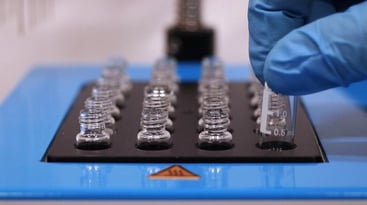
Nitrogen is often used as a carrier gas in gas chromatography. High-purity nitrogen ensures accurate and reliable results by preventing contamination and maintaining the integrity of the samples. Nitrogen generators provide a continuous supply of nitrogen, eliminating the need for gas cylinders and ensuring consistent performance.
2. Liquid Chromatography-Mass Spectrometry (LC-MS)
In LC-MS, nitrogen is used to dry the solvent in the sample, assist in the nebulization process, and sometimes as a curtain gas. The high purity of nitrogen is crucial for maintaining the sensitivity and accuracy of the analysis. Nitrogen generators provide a reliable and cost-effective source of high-purity nitrogen for these applications.
3. Sample Preparation
Nitrogen gas is used in various sample preparation techniques, including nitrogen blowdown evaporation and nitrogen purging. These techniques require a consistent and pure nitrogen supply to ensure the efficiency and accuracy of the sample prep process. Nitrogen generators offer a convenient and efficient solution for these needs.
4. Food & Beverage Industry
Nitrogen is used in the food and beverage industry for packaging and preservation. It helps to displace oxygen, thereby preventing oxidation and extending the shelf life of products. Nitrogen generators provide a continuous and reliable supply of nitrogen, ensuring consistent quality and safety of food and beverage products.
5. Pharmaceutical Industry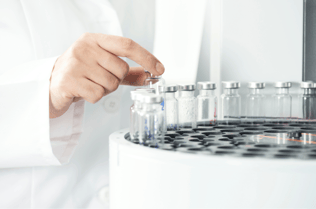
In the pharmaceutical industry, nitrogen is used for inerting, blanketing, and purging processes to prevent oxidation and contamination of sensitive materials. Nitrogen generators ensure a consistent supply of high-purity nitrogen, which is essential for maintaining the quality and safety of pharmaceutical products.
6. Chemical & Petrochemical Industries
Nitrogen is used in the chemical and petrochemical industries for inerting, blanketing, and purging to prevent explosions and contamination. Nitrogen generators provide a reliable and continuous supply of nitrogen, ensuring safety and efficiency in these critical processes.
7. Electronics Manufacturing
In electronics manufacturing, nitrogen is used for soldering, inerting, and blanketing to prevent oxidation and improve the quality of electronic components. Nitrogen generators provide a continuous supply of high-purity nitrogen, ensuring consistent quality and performance in electronics manufacturing processes.
8. Metallurgy
Nitrogen is used in metallurgy for heat treatment and as a shielding gas in welding and brazing processes. Nitrogen generators provide a continuous and reliable supply of high-purity nitrogen, ensuring the integrity and quality of metal products.
Popular Nitrogen Generators on the Market
%20side%20-%20small.png?width=208&height=208&name=NITRO-GEN+%20(NA1935)%20side%20-%20small.png)
1. Organomation
Organomation offers nitrogen generators that are particularly well-suited for sample preparation applications. Their systems are designed to provide high-purity nitrogen efficiently and reliably.
 2. Claind
2. Claind
Claind is known for cutting-edge nitrogen generation technology, providing reliable and efficient solutions for a wide range of laboratory applications. Their nitrogen generators are designed to deliver consistent performance with minimal maintenance.
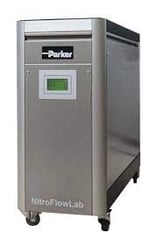
3. Parker Balston
Parker Balston offers a range of nitrogen generators known for their reliability and high performance. Their PSA and membrane generators cater to various purity and flow rate requirements.
 4. Peak Scientific
4. Peak Scientific
Peak Scientific is renowned for its innovative and user-friendly nitrogen generators. Their Genius and Infinity series provide robust solutions for laboratories with diverse nitrogen demands.
View the latest nitrogen generator pricing information in a detailed head-to-head product matrix.
Making the Final Decision
1. Assessing Your Needs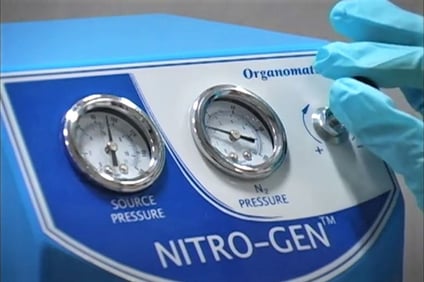
Evaluate your lab's specific requirements, considering factors such as purity, flow rate, and pressure. Match these needs with the features offered by the nitrogen generators reviewed in this guide.
If you're looking for a generator for your nitrogen evaporator, check out our generator recommendation chart which provides suitable generator options for popular evaporator models from top manufacturers.
2. Considering Future Growth
Anticipate future growth and changes in your laboratory's operations. Choosing a nitrogen generator with a slightly higher capacity or additional features can provide flexibility to accommodate future demands you may have.
3. Seeking Expert Advise
Consult with manufacturers or suppliers to gain further insights into the capabilities and benefits of different nitrogen generators. Their expertise can help clarify any uncertainties and guide you toward the best choice.
Use our nitrogen generator product finder tool for a quick and easy generator recommendation for your needs!
4. Calculating Total Cost of Ownership
Consider the total cost of ownership, including the initial purchase price, maintenance costs, and potential savings from eliminating cylinder deliveries. This comprehensive view will help you make a financially sound decision.
Use our generator payback calculator to determine how much you could be saving with a generator!
Conclusion
Selecting the right nitrogen generator is crucial for maintaining the efficiency, accuracy, and cost-effectiveness of your laboratory operations. By considering the key factors outlined in this guide and comparing popular models, you can confidently choose the nitrogen generator that best meets your laboratory's needs. Investing in a high-quality nitrogen generator will not only enhance your laboratory's performance but also provide long-term savings and reliability.
Up Next: Nitrogen generators for analytical chemistry - Everything you need to know
